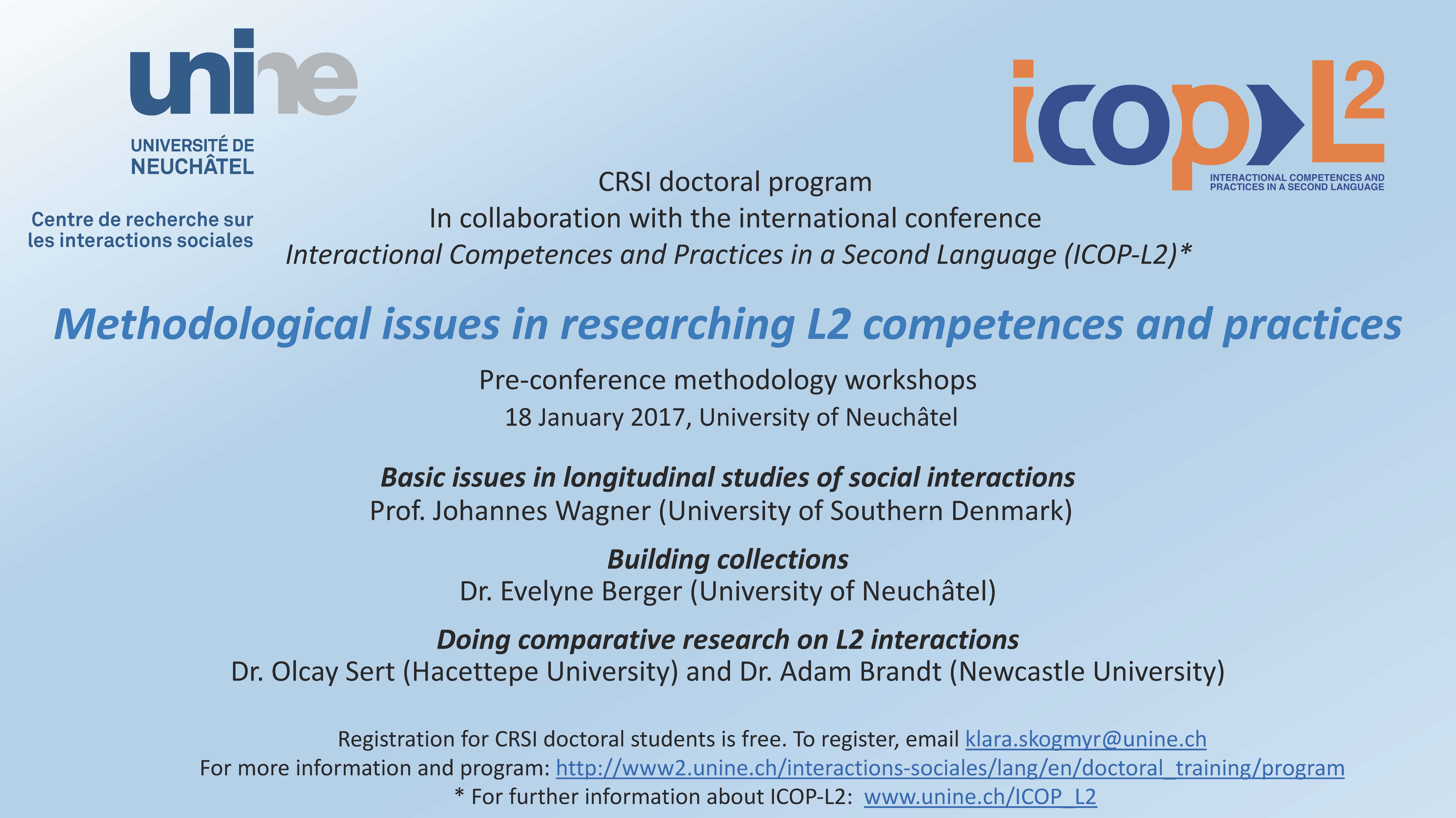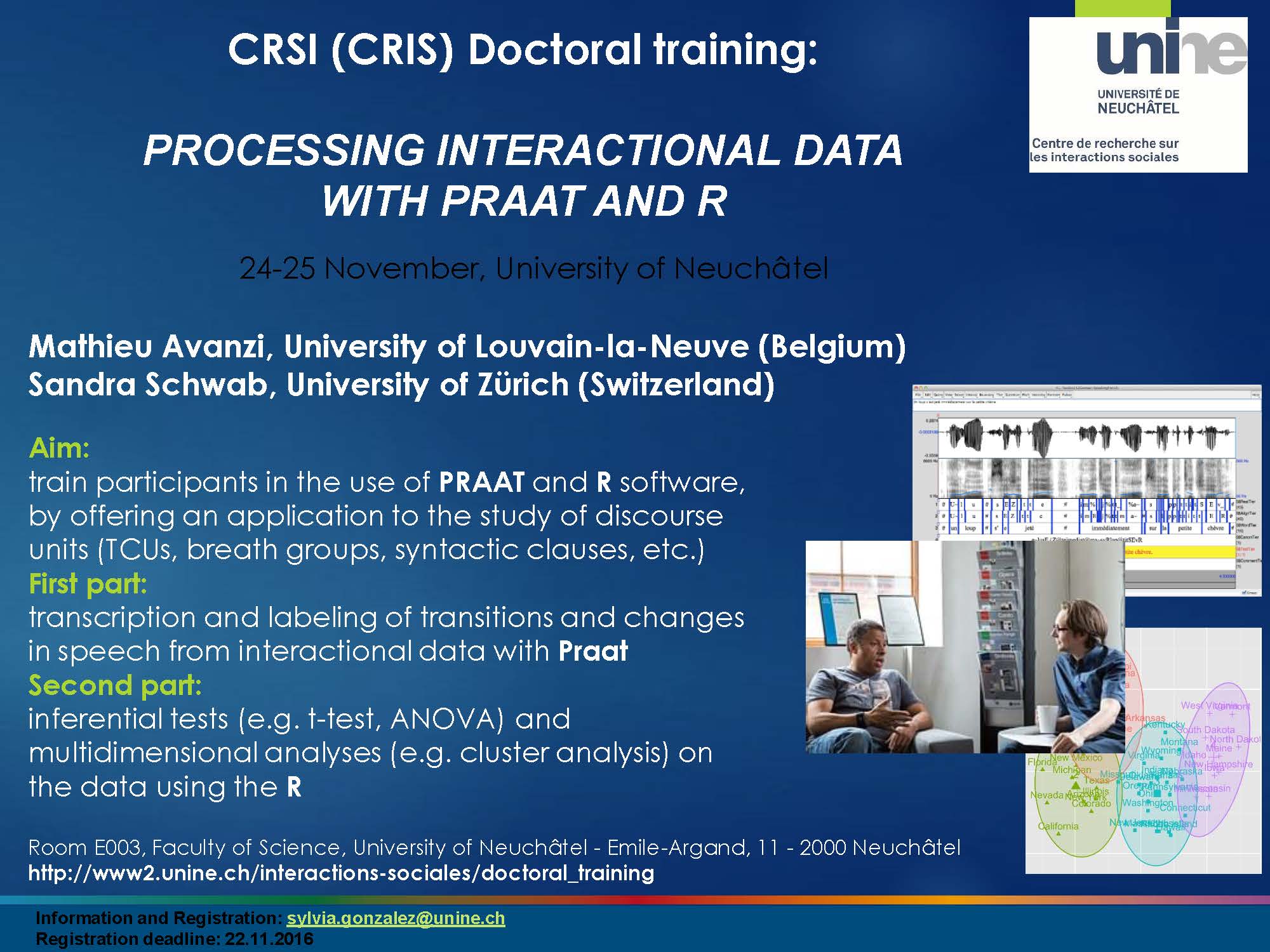Past events
Le CRIS est désormais INACTIF.
Formation doctorale sur la revue systématique de la littérature
Elle a eu lieu via Cisco Webex meetings le 28 avril 2020.
La formation s'intitule: Processus et méthode de réalisation d’une revue systématique de la littérature
L’objectif de cette journée était de fournir aux participant-e-s une méthode explicite de recherche, sélection et analyse de données scientifiques en vue de réaliser une revue systématique de manière autonome.
Déroulement de la journée:
- Une partie consacrée à la présentation des étapes clés et aux outils utilisés pour produire une revue systématique (bases de données, choix des mots clés, etc.). Ces étapes seront illustrées à l’aide d’exemples issus de diverses disciplines (psycholinguistique, linguistique, logopédie etc.)
- Un atelier permettant aux participants de s’exercer à cette méthode. Cette partie donnera également la possibilité aux participants qui le souhaitent de travailler sur leurs propres données et de partager des réflexions/questionnements sur leur travail.
Intervenante :
Dr. Nancy Durieux - Université de Liège (Belgique)
directrice du Secteur des Sciences de la Santé de l’ULiège Library
Langue de la formation : français
En raison des mesures liées au COVID-19 cette formation a été donnée par visioconférence (Cisco Webex meetings)
Doctoral Workshop "Modèles linéaires généralisés à effets mixtes pour données qualitatives dans R"
Doctoral Workshop "Les focus groups: de la récolte à l'analyse des données"

General information
Initialement désignée par le terme Focused Interview, la méthode des focus groups remonte à 1941 lorsque Robert Merton participe à une expérience de Paul Lazarsfeld dans laquelle une dizaine de participants étaient invités à évaluer leurs émotions face à des événements rapportés dans les media. La méthode s’est ensuite développée, donnant lieu à la méthode des focus groups proprement dite.
Souvent utilisée comme outil d’intervention de l’action sociale, de la promotion de la santé ou d’activités de formation, elle a par la suite été reprise par les chercheurs en psychologie sociale ou autres sciences sociales qui l’ont adaptée à leurs propres objectifs. C’est ainsi que la méthode (seule ou combinée à d’autres méthodes) a été utilisée pour étudier les processus de formation et de transformation des opinions, systèmes de croyance et représentations sociales. L’étude des dynamiques de groupe et des processus interactionnels, qui était au centre des préoccupations de Merton, a cependant été peu à peu éclipsée par une analyse portant sur les contenus des discussions en focus groups.
Considérant que cette méthode permet de saisir aussi bien les opinions, attitudes ou représentations sociales que leur construction et leur modification sous l’effet des dynamiques interactives, cette journée doctorale vise à présenter la méthode des focus groups, en partant des modalités de collecte des données pour se centrer sur deux approches d’analyses de données : l’une thématique et l’autre dialogique. Travaillant sur des exemples de recherche qui recourent à ces méthodes d’analyse, on montrera les avantages et limites de chacune. On examinera aussi, « données en main », les possibilités de les articuler.
Les doctorant.e.s seront par ailleurs invité.e.s à travailler sur des exemples tirés de corpus de données récoltées dans deux différents terrains de recherche par les intervenants.
Invited speakers
Francesco Arcidiacono est professeur à la HEP-BEJUNE et dirige le Département de la Recherche au sein de la même institution. Ses intérêts de recherche portent sur l’application des méthodes mixtes en sciences de l’éducation et sur l’analyse des processus socio-interactionnels en contextes d’éducation.
Michèle Grossen est professeure de psychosociologie clinique à l’Université de Lausanne, Faculté des sciences sociales et politiques. Ses travaux de recherche portent sur les situations de communication dans le domaine de l’apprentissage et d’autres situations sociales, en particulier l’entretien clinique.
Antonio Iannaccone est professeur à l’institut de psychologie et éducation de l’Université de Neuchâtel. Ses travaux de recherche traitent principalement des effets des interactions sociales sur le développement cognitif et les processus d’apprentissage dans différents contextes scolaires.
Giuseppe Melfi est docteur en mathématiques. Il est responsable de projets de recherche à la HEP-BEJUNE et expert d’analyse quantitative appliquée aux sciences de l’éducation.
Program of the workshop
Date: March 31 2017
Place: University of Neuchâtel, FLSH
Methodological issues in research on L2 interactional competences and practices
CRSI doctoral training and pre-conference workshops for the conference "Interactional Competences and Practices in a Second Language" (ICOP-L2)

General information
The workshops aim to provide hands-on training on methodological aspects of the analysis of second language (L2) competences and practices in naturally occurring data. The workshops specifically target those who are already to some extent familiar with micro-analytic research on social interaction, and who are interested in issues of learning and/or qualitative research methodology.
Date: 18 January 2017
Place: University of Neuchâtel, Faculty of Economics and Business
Language: Anglais
Number of participants: 25
Doctoral workshop of the CRSI
Processing interactional data with Praat and R

Date: November 24-25 2016
Place: University of Neuchâtel, Faculty of Science, room E.003
Language: English
Number of participants: 15
Prerequisites: none
Material: headphone, laptop (if possible)
Registration is required. Please contact Sylvia Gonzalez
General information
The recent application of information technology tools for research has allowed many disciplines working on social interaction to objectively study language structures and mechanisms.
Among these devices, the Praat software package is nowadays the reference tool which is used for the annotation and analysis of the phonetic aspects of speech (disfluencis, pauses, speech rate, fundamental frequency, formants, etc.). The R software package (a tool for statistical processing) is generally used to complete the acoustic analysis produced under Praat, allowing to link language behaviors with intra- and inter-speaker related variables (gender, age, personality traits, cognitive abilities), discourse contents (syntactic structure, emotional content), social context (group membership, stress), etc.
The use of these packages is an asset for researchers whose aim is to describe, explain and justify the operating mode of complex interactional mechanisms. The aim of the workshop is to guide and train participants in it use, by offering an application to the study of discourse units (TCUs, breath groups, syntactic clauses). The first part of the workshop is dedicated to the transcription and labeling of transitions and changes in speech from interactional data with Praat. It specifically addresses the transcription, alignment and coding. The second part of the workshop is devoted to the analysis of data using R. More specifically, the data that have been transcribed, aligned and labeled during the first day will be processed using inferential tests (e.g. t-test, ANOVA) and multidimensional analyses (e.g. cluster analysis).
Speakers :
-
Mathieu Avanzi, Université de Louvain-la-Neuve (Belgique)
- Sandra Schwab, Université de Zürich (Suisse)
Aims : At the end of the workshop, participants should be able to provide a prosodic analysis of discourse units, and test statistically in which extent the identified cues are related to linguistic and non-linguistic factors. Here are some examples of analyses that will be presented during the workshop:
- Automatically label intonational contours associated with the last syllables of TCUs or other linguistic related units;
- Examine the prosodic correlates of topical structure (do different topic types – e.g. introduction, shift, continuing topics – present different acoustic profiles?)
- Measure the pace at which a speaker articulates, and compare different speakers in different interactional activities or situations
Practical aspects
- Installation of the softwares on the computers of the participants
- Tutorials will be distributed
- Conversion software to convert data transcribed in other formats (ELAN, TRANSANA, etc.) within Praat will be presented
- PhD students can propose their own encodings depending on their own interests and bring their data to work on it or discuss encoding tracks and analyzes
Program
Day 1 : Data preparation on PRAAT
- 9: 00 – 10: 30 > Introduction and training on Praat
- 10: 30 – 11: 00 > Coffee break
- 11: 00 – 12: 00 > Transcription and alignment (with EasyAlign)
- 12: 00 – 13: 30 > Lunch
- 13: 30 – 15: 00 > Annotation and labeling at different levels
- 15: 00 – 15: 30 > Coffee break
- 15: 30 – 17: 00 > Manipulation of scripts (verification and data extraction)
Day 2 : Annotated data analysis on R
- 9: 00 – 10: 15 > Introduction and training on R
- 10: 15 – 10: 30 > Coffee break
- 10: 30 – 12: 00 > Hypothesis tests and comparison: chi-square, t-test, ANOVA
- 12: 00 – 13: 30 > Lunch
- 13: 30 – 15: 00 > Introduction to multidimensional analysis
- 15 : 00 – 15: 30 > Coffee break
- 15 : 30 – 17: 00 > Questions and exercises
Doctoral workshop "Les artéfacts technologiques au service des interactions sociales"
Doctoral Workshop "Phénomènes multimodaux en interaction: méthodes et outils d'analyse"
Statistical training (part I)
Descriptive and inferential statistics (application on SPSS)
Date: October 14th 2015
Place: University of Neuchâtel, Faculty of Science, room E.026
Number of participants: 25
Language: French
Statistical training (part II)
Logistic regression (application on Air Studio)
Speaker: Dr. Iglésias Rütishauser (MAPS, University of Neuchâtel)
Date : October 23rd 2015
Place: University of Neuchâtel, Faculty of Science, room E.026
Number of participants : 15
Language: French
Eye tracking fundamentals
Workshop organized around the visit of Dr. Anja Stukenbrock (Université de Jena)
Opening conference of the CRSI’s doctoral training

- Prof. Simoma Pekarek-Doehler (University of Neuchâtel), Analyser la compétence d’interaction: l’approche de l’analyse conversationnelle
- Dr. Maud Champagne-Lavau (Aix-Marseille University, Laboratoire Parole et Langage), Quels paradigmes expérimentaux pour évaluer l'attribution de connaissances et de croyances à autrui durant une interaction?




